
Sleeping koyukkuri. (Click to play)
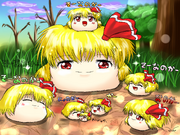
A mother Rumia yukkuri with koyukkuris.
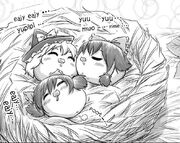
Koyukkuri in a nest.
Koyukkuris are the juvenile form of yukkuris. Despite being born in several different ways, the average koyukkuri is never smaller than a cherry tomato and never bigger than a tangerine; save for mini-yukkuris (see House yu and Pet Yukkuris) or yukkuris whose growth was stunted by lack of nutrition. Past tangerine size, a yukkuri is deemed an adult.
Physical Characteristics[]
(see Premature Yukkuri for premature pregnancies)
A Koyukkuri has always the same characteristics as one of its two birth parents, only smaller. Their smaller size and utter lack of skills make them extremely frail, to the point that some authors have named them Walking Death Flags. Their survival rate is dim at most since birth, thus the extremely high birth rate of the average yukkuri is the only thing keeping the race as whole going.
A newborn yukkuri is extremely frail. Even if it manages to survive its birth, its skin is more thin and less pliable than that of a young or adult yukkuri. As such, it tears and wounds easily. Furthermore, a koyukkuri can hold only a very small amount of paste, which means it has to be fed often (once every two hours) to leave its body enough time to digest the nutrient. Otherwise, a koyukkuri would take a characteristic gourd-shape, the human equivalent of morbid obesity, or even gorge itself to death.
Despite developing fast, koyukkuris generally can’t move on their own for at least three days after birth. After that, they learn to do small hops and crawl around, mostly to rub rub with their parents. Flying type yukkuris develop the ability to fly with their parents in time, much like small birds. Despite being fully aware of their surroundings, koyukkuris are extremely dependent from their parents. They can’t feed on their own, take care for themselves or poo poo alone, needing to be licked clean after excretment, sometimes before to simulate. Some stories show orphan koyukkuris able to scrape a meager existence for themselves. Even if they manage to do so, a distressed life like that is nowhere close to truly “taking it easy,” as a koyukkuri in the wild gets often bullied by shitheads, in a constant state of disarray, malnutrition and mental underdevelopment. Someone wanting to care for a koyukkuri in captivity must therefore suitably replace those essential interactions by frequently caressing the ko (thus doing “rub rub”), massaging its belly with a damp cloth after every meal (thus doing “lick lick” without actually licking it) and keeping it always clean.
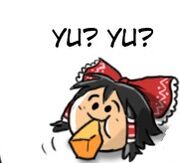
A koyukkuri eating a crumb. Once they get older, solid foods are fine for them.
While many animals can’t eat solid foods before being weaned, koyukkuris’ first meal must necessarily, in case of stalk birth, be their stalk , munched by their mother and softened because of their inability to bite without breaking their small sugary teeth. The stalk contains special substances fortifying their immune system, like mother’s milk for mammals. In captivity, a human can always soften a commercially available stalk with water and present the paste to the koyukkuri.
A koyukkuri, full aware of its surroundings even in its “pre-born” status, can draw from a definite baggage of genetic memories such as the drive to “take it easy,” faint concepts of the main tenets of adult life (such as hunt hunt and basic rules and taboos) and the ability to speak. About the last of these, it should noted that koyukkuris always speak in a slurred way, much like distressed adult yukkuris do. That doesn't mean koyukkuris are in a state of despair. It's just they have not developed the proper speaking skills and that’s the most they can say based on their genetic memories. Much like human kids, koyukkuris have to learn how to speak properly by mimicking their parents (or a human, if bred in captivity). An orphan koyukkuri may be unable to speak properly for the rest of its natural life. In extreme cases, as that of Yukkuri Meilings, entire clans are mostly mute save for the continuing “jaaoo-oon” cry that yukkuris can somewhat understand. Only exposure to language in their earliest days can make these komeilings speak in coherent sentences. In some stories, though, extremely small koyukkuris and premature ones are shown only able to utter faint “yu”-ing sounds or "eajy". However, in that case, while a human child learns a small number of words at time, a koyukkuri may fully develop speech all of a sudden, albeit with its childish slur.
A healthy koyukkuri is supposed to be always and endlessly hopping around (thus strengthening its bottom), playing with everyone and everything that enters its field of vision, screaming their “Chake id eajy” and songs at the top of their lungs and keeping (or rather, letting adult yukkuris or humans keep) their accessories clean, keeping themselves ready for their lives as adults. A koyukkuri that’s too quiet or unwilling to play may be suffering of some physical or psychological ailment. A koyukkuri with a damaged accessory may be a victim of bullying, or it may be quarrelsome, a bully koyukkuri itself, always fighting and arguing.
Behavior[]
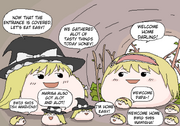
A Marsia and Alice family with at least two generation of koyukkuris.
Koyukkuris form strong bonds with their parents, or whoever they perceive to be their parents, much like imprinting. It’s not uncommon for a captivity-bred koyukkuri believe that an Anon is its parent, calling them loudly “mommy” or “daddy.” As a part of its genetic memories, a koyukkuri will expect anxiously to be greeted back after announcing its birth with a loud “chake id eajy,” by both its birth parents (or human owner) and acting sad and dismayed whenever it finds itself orphaned. Another peculiarity of the genetic memories of the koyukkuri is that, even if the koyukkuri is born along with its sibling with a stalk pregnancy, it will always describe itself as a "big", "widdle" or "middle shishter", as, according to its knowledge, it isn't born the moment it sprouted from the stalk or started swaying and speaking, but since the moment it detached and greeted its family. Thus, the first koyukkuri to fall will actively cheer its "widdle shishter", happily begging them to "Be bworn eajy!". Despite notable exceptions, an adult Yukkuri will always give birth to two types of koyukkuris, with part of the litter taking the type of the father and part of the litter taking the type of the mother Yukkuri. That often puts a strain in the blissful relation between parents and children Yukkuris, as both the parent, both the koyukkuri, may end being partial to the family members of the same type, finding hard to relate, or even forsaking the different kind members. While a Deibu with a Marisa companion could openly spoil its koyukkureimus and forsaking its koyukkurisas, in a nicehead family the
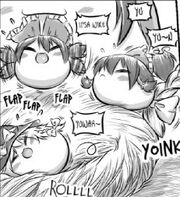
Even getting into a nest requires the assistance of the parents. As the koyukkuri get older, getting into and out of the nest becomes easier.
koyukkureimus will spend their entire time by bonding with their mother and learning how to sing, while their koyukkurisas sisters, finding their behaviour annoying and distasteful, would follow the Marisa parent and engage in a more active lifestyle by playing hunt hunt and exerting themselves in physical activities. It should be noted however that, as with the Marisa and Alice family in the picture shown, while doing common activities, such as playing or lazying in the nest, the nicehead koyukkuris will always act cheerful and nice to each other, showing reciprocal appreciation, but just drifting towards different interests (in this case, homemaking for the koarisukkuri, hunting for the komarisas). In extreme cases the parent yukkuri, the koyukkuri or both at once may outright bully, abuse and/or kill the different-type kos, especially if they're of a loathed type (the koalice offspring of a raper Alice, for example) or the same-type parent is dead or absent. In other, rarer cases, a widowed yukkuri may become increasingly attached to the other-type offspring, as it's the last memento of its lost partner and thinks that, by grooming the ko into a proper yukkuri, will honor its sacrifice and/or their life together.
However, koyukkuris break bonds as easily as they form them. A shithead koyukkuri, especially, may end up rejecting a parent over serious issues, such as the parent refusing to feed it or even harming or abandoning it, or trivial ones such as the parent lacking its accessory or bearing disfiguring injuries (In this case, the koyukkuri will draw upon its genetic memories to decide that its parent isn't a yukkuri, but a scary and dangerous creature) or failing to do bonding rituals such as rub rub and lick lick. In the wild, koyukkuris show the same instincts as adult yukkuris, but they complete their education by playing. Some stories follow koyukkuris learning basic things from more wise and expert yukkuris, as Yukkuri Patchouli, but they mostly follow the same-species birth parent, playing out for themselves what they see, as hunting small prey (such as caterpillars), bringing home grass and other easy-to-get food for their smaller siblings.In an extreme form of “Monkey See, Monkey Do,” koyukkuris overall exaggerate the nonsensical aspects of the already zany behavior of their adult counterparts. While a yukkuri finds its own poo poo distasteful and stinky, a koyukkuri will actually try to puff puff it into submission and make it go away. While a yukkuri may be forgetful, a koreimu may be fascinated by its own forelock and roll around while trying to nibble at it, much like a dog with its tail.
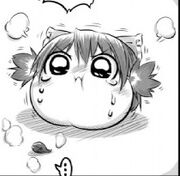
A "Wasa Wasa" koyukkuri Reimu puffing up at its own excrement.
While adult yukkuris have a strong drive for refreshing and “having little ones,” koyukkuris feel a strong need for companions, playing with other koyukkuris and actively pestering their parents for giving them “widdle shisters to play with.” A koyukkuri “big shish” will then act with the “widdle shishter” much like a surrogate parent and a play mate, eager to show it whatever it has learned from their parents and basking in its admiration, while the “little sisters” will usually shout at every occasion “big shish ish amashing” or other loud ways of expressing approval. Of course, since a shithead yukkuri is fast at abandoning its offspring to ensure its own survival or take it more easy itself, a shithead koyukkuri could always turn against its “beloved” sisters, because they lost their accessory or out of sheer jealousy, as they “hog all mommy’s/daddy’s attentions.” On some occasions, a koyukkuri may loathe an “uneasy” sibling. On other occasions, it can try its best to make its sibling (even if clumsily) “easy” again. Similarly, a parent yukkuri may shower their “easier” offspring with attention and outright neglect an underdeveloped, damaged, premature or buristic koyukkuri. That also happens with animal litters, in which, while the parents care for every single offspring under optimal conditions, the little ones start to compete actively with each other under duress, leaving the runt of the litter to die of neglect or starvation.
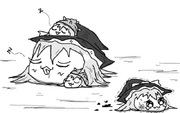
A normal-type koyukkurisa, abandoned by its mother. In the wild, once a parent yukkuri refuses to care for its offspring, the ko is condemned to die out of starvation, illness or anti-yukkuritis
An even deeper divide will form if one of the koyukkuris in the litter is a "special" type, as a rare Shelled Marisa born in a regular, mundane Yukkuri Marisa family, an hybrid Yukkuri or a different colored Yukkuri. While hybrids and koyukkuris with different looking accessories would be almost always abandoned as "uneasy", if not outright lynched by their own family, rare types, as the Shelled Marisa, will be lavished with attentions, both by their parents, both by their "bigger shishters". However, while the parents will endlessly brag about the "easiness" of their precious little one, the other koyukkuris in the litter may pass from sharing the same enthusiasm and joy of having an adored and admired sister from envy and anger, further enhanced by the neglect they'd surely face from their parents (devoting themselves to care for the "most easy little one") and their peers (the adult ones admiring the "Special" koyukkuri, the other kos more willing to play with the easy looking koyukkuri than with its mundane, common looking siblings). At the first occasion, the unsupervised koyukkuris in such a litter may end abusing, bullying and even killing their own sibling, venting up their anger and believing to have removed a competitor for the love of their parents. Such attempts however always end in tragedy, with the parent Yukkuris deeming their murderous offspring "uneasy" and violently killing them on the spot.
However, while other lifeforms apply a strong “survival of the fittest” rule, koyukkuris suffer from a lackadaisical concept of “fit to live,” more akin to a “survival of the easiest.” A shithead parent may believe a nicehead koyukkuri “scum” and “uneasy” for associating itself with other niceheads or refusing to engage in shithead behavior (such as stealing from humans or other yukkuris), with the nicehead koyukkuri being bullied or ostracized for it, or this parent may simply, especially if a single parent, care for the offspring of its own type and let the ones of its lost companion’s type die, feeling more “akin” to the rest. Often, the koalice offspring of a raper Alice will be actively bullied and mistreated by a survivor of yukkuri rape, prevented from bonding with their other type sibling and left to fend for themselves, if not outright killed. In such case, the “suriviving” koyukkuri may actually be weaker or less able to survive in the wild, thus ensuring the extinction of the family clan. Moreover, the parents themselves may actively care for and protect only the koyukkuri less likely to survive on their own devices later, forsaking and forgetting about the healthier ones because they're less interesting. A chief example is the birth of a land-dwelling "Shell Marisa" in a family of regular-type Marisas. While a Shell Marisa is too heavy to move on its own as fast as other yukkuri (especially if lacks a suii), it cannot hop or do stretch stretch to reach taller places, it's still perceived by its parents as "novelty", easy because of it unique accessory. As such, a parent Marisa may fully devote itself to the care of its shelled offspring, neglecting and abandoning its regular-type Marisa and other type offspring to the point of killing them of starvation and/or anti-yukkuritis, and than abandoning the now adult Shell Marisas upon becoming aware that, by a combination of their less-than-beneficial mutations and their spoiled upbringing, they've become shitheads unable to care for themselves.
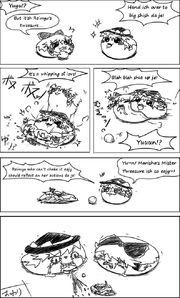
A shithead Komarsia murdering its sister. Unlike most times, the parents take full responsibility and kill the komarsia due to this behavior.
Since yukkuris are essentially social beings, koyukkuris can’t live without constant attention and social contact, easily developing anti-yukkuritis. A lonely pet yukkuri will spend its whole time pressed against the yukkurarium’s walls loudly weeping for its owner. A captive bred koyukkuri, while understanding that its owner has to go to work to “hunt hunt,” may grow lonely and sad, insistently crying for its owner to come back and even declaring that it doesn't need to be fed to take it easy as long as it’s cared for. In some stories, the nicehead offspring of shithead parents, upon being cared for by a human, actively turns against its birth parents, seeing the human as its real parent, whereas the pampered (nicehead) offspring of a pet yukkuri with no other parent (due to abandonment, pregnancy with a stray or insemination by “reproductive filling” bought in a Yukkuri Pet Shop) may happily proclaim its owner its “daddy” or “mommy” (due to the similar role of “breadwinner” in the average yukkuri couple), showing amazement and appreciation for a “mommy able to marry a much easier mister human as a mister daddy.”
A koyukkuri left alone on its own devices for an extended period of time will develop anti-yukkuritis even if provided with enough food and water to keep itself alive. Even the most resilient ones will develop a psychotically behaviour ending with outright madness, as hallucinating, showing suicidal tendencies or retreat into an entirely imaginary world, spending its time in a catatonic state before finally dying of starvation or Anti-Yukkuritis. Even if a koyukkuri is strong enough to thrive in the wild, a lengthy period of isolation will always take its toll on its growth patterns; a lonely Yukkuri will always be smaller than its brethren, due to its lack of proper nutrition during its growth (having to learn how to hunt hunt by itself), and only able to speak with the slurred speech patterns of a koyukkuri, if not with the stilted, half-remembered words of a premature. The psychological damage received by growing up alone is irreversible, and the lonely koyukkuri will never mature fully. It's not uncommon for an orphan koyukkuri living under the delusion to have still parents elsewhere in the world, and that they will return to care for their "lost" offspring if it shows to be easy enough to be part of Yukkuri society, despite its lack of socialization left it an outcast, perpetually unable to interact properly with its peers.
Also, for the same reason koyukkuri are even less equipped than their adult counterparts to deal with rejection and peer pressure; even a fully adjusted koykkuri, upon being denied the "right" to "Take it Easy" with other yukkuri (for example a stray trying to play and socialize with pets, an orphan trying to socialize with other koyukkuris and their families) may develop a terminal form of anti-yukkuritis, vomiting bean paste and weakly complaining about its alleged ability to be "easy" till death.
In every case, along with rub rub, lick lick (or “clean clean,” in this case) and high high, koyukkuris may show their appreciation for their human owners by blissfully “munching” on their fingertips. That’s actually a sign of bonding, and the owner is encouraged to let them do so or let the koyukkuri out of their yukkurarium to play actively with them (under the loving supervision of the yukkuri parent, if available), just taking in account the frail bodies of the kos and, as a rule of safety, forbidding them from doing “rub rub with mister feet.” As small as they are, koykkuris could make a habit of jumping under their owner’s feet to play, with catastrophic results.
Much like human kids enjoy toys, koyukkuris may be gifted with “mister treasures.” In the wild, they often bring flowers and small rocks into their nests to play with. In the cities, shiny pieces of trash. Pet yukkuris may enjoy small toys bought in the Yukkuri Pet Shops, often related to the Touhou Project characters they emulate. A koyukkuri may grow attached to its “mister treasures,” flatly refusing to share them with anyone else. As some kids may speak to their dolls, some lonely koyukkuris may speak to their “mister treasures.” Owing to their childish mindset and relative lack of intelligence, lonely koyukkuris may forge some sort of bond with yukkuri dolls, or even balls with yukkuri faces painted on them, as if they were real. While yukkuri pet shops usually sell already badged yukkuris, it's also possible to acquire newborn koyukkuris for a much cheaper price, usually even lower than a “regular” manjū one, and training them at home, delaying the costs of going through the badge system (or simply forsaking the badge process, provided you don’t plan to let the yukkuri roam by itself). While a koyukkuri is usually more pliable and willing to learn and develop new habits than a grown yukkuri, it still has its inborn character flaws. The best course of action upon buying a clearly shithead koyukkuri is sending it back, sending it to the Factory, or getting rid of it, because if you don’t manage to set it straight after a few days of training, it won’t change its mind frame at all and would have to be disposed of.
While Yukkuris are a somewhat unintelligent, silly and gullible lifeforms, koyukkuris, lacking even the meager amount of expertise and common sense a Yukkuri is forced to build during its life, and are gullible to a pathetic fault. There are recorded cases of a koyukkuri convinced to allow itself to be buried in a time capsule, with the promise that after ten years the kid anon responsible for its entombment would return and take it as a pet Yukkuri, even thanking the Anon for its impending demise, and koyukkuris convinced to wait in a certain spot for candies or even a new home, and left there starving, waiting for the fulfillment of their promise. Also, the lack of experience and maturity ends often in brasher, more childish and almost suicidal acts and behavior: oblivious to the dangers the average Anon may pose, a koyukkuri may end trying to take it easy with every Yukkuri and human in sight, expecting to receive the same attention and care it would enjoy from its birth parents. Even a good natured ko may end trying to play with a dangerous animal or a bully Anon, genuinely convincing to be helpful and appreciated, and unaware of the dangers it may pose. Commonly, a stray koyukkuri, utterly oblivious to the divide between pet Yukkuris and strays, would attempt to bond with other pets or even their human owners, reasoning that, since its parents act nicely, every other Yukkuri would enjoy playing and caring for it, being abused and beaten for its attempts. Instead, a wild koyukkuri can always be bribed into showing an abusive Anon where its entire family is nestling by promising it better food and easy gifts for the entire family.
While Yukkuris as a whole are a simple race, koyukkuris act mostly as overtly sheltered little kids, believing that every stranger they meet is as nice as its family. Though being raised to "take it easy" certainly helps that cause. Furthermore, the usual forgetfulness the whole Yukkuri race shares is somehow enhanced in a koyukkuri. The koyukkuri offspring of a shithead parent will still keep endlessly trying to interact with its abusive parent, even after being injured and attacked:;as soon as its instinctual need to "Do wub wub wif mwommie" will arise, the koyukkuri will forget the source of its painful injuries, literally walking to its death. A pet koyukkuri severely beaten or over punished by its owner will always forgive the Anon after receiving some sweets and a little appreciation, or even an half-hearted excuse, even forgetting the whole thing in a matter of hours.
However, that doesn't mean koyukkuris lack the ability to associate pain and the action that brought them to them; a koyukkuri attempting to eat something too hard for its teeth may end starving itself to death due to trauma, and, if they manage to survive, koyukkuri may learn to avoid dangerous places and items by associating them with pain, to the point that an Anon may simply let a koyukkuri roam its room, healing it after every accident to teach it what items it should avoid and with what items it can play safely. However, as with adult yukkuris, koyukkuris lack the mental acuity needed to associate directly the pain they felt with their actions; while a cub or a puppy would associate, for example, pressing its paw on some abandoned thumbtacks with pain, and correlate the action of pressing the paw on sharp items with pain, a koyukkuri will loudly complain that "Mishter Hurt Hurt are uneajy becaush they wade Yukkuchi [name] uneaji. Yukkuchi [name] will puff puff and punish uneaji Mishter" and, failing to threaten the inanimate object, deem it uneasy and abstain from interacting with it in future as it was "bad" to it.
Despite being born fully formed, able to speak and move on their own and interact with the environment, with a well set knowledge about the basic tenets of Yukkuri life, koyukkuri are still extremely dependent from their parents or owners. This, coupled with the addled mindset of Yukkuris, poses a great danger to them in many situations. Koyukkuris enjoy playing high high, being carried on the brim of their Marisa father or other Yukkuri with an accessory to latch on; however, on some very rare places or if the koyukkuri is playing for to long, the parent may end forgetting about having koyukkuris on its head and the koyukkuris themselves may start hopping on the brim, carried over by the game and the nice sensation and fall. Also, whenever a predator approaches, Yukkuris and koyukkuris share the instinctive knowledge that the mouth of a parent is one the safest place to hide, and thus entire litters of koyukkuri, encouraged by their parents, will try to hop in their mouths, happily mocking the would-to-be predator. While this action may rarely work, as it allows the parents to escape safely carrying the koyukkuri with them, or hide their quarrelsome presence to the predators, in most cases it backfire tragically, as the koyukkuri are still loud enough to draw attentions on themselves and their parent. Furthermore, if the danger protracts for too much, the Yukkuri parent will forget about having its little one in its mouth, thus leaving them to melt in its own saliva or munch munch on them by believing that, since it was so heroic to save its offspring, it was somehow rewarded with sweets. On the koyukkuri side however, the koyukkuris would feel so safe to give an Home Declaration in their parent mouth, starting to poo and pee there, or instead complaining about the long time taken from their parent to let them free and bite an escape route for themselves, ripping their cheeks open. Some abusive Anon, in this cases, just tape over the mouth of the parent Yukkuri, hastening this process.
Furthermore, even if the Yukkuri Parents can afford to get some sweets, the smartest one always have great care to feed their koyukkuris only bland tasting food, such as munched grass, mushrooms, and insects. While a casual observer would believe those the actions of a shithead, and think that the best Yukkuri parents is the one who gives the best food to its koyukkuris, actually such a parent Yukkuri is protecting the ability to survive of its offspring. Koyukkuris grow easily spoiled, and if they learn to accept even the most foul tasting food as "Happyness", they'll have a better ability to survive in every environment and season. However this brings them into a weird cycle, in which koyukkuris born in summer and spring are more likely to be exposed to flowers, caterpillars, butterflies, berries and other tasty, nutritious and fine food, thus becoming restless and complaining during the whole Winter confinment, when they can only eat grass, mushrooms and nuts. However, koyukkuris born in autumn and winter are likely to spend their first months of life locked in the winter confinement, thus having scarce resources, and being unable to feed as frequently as they need to keep themselves alive. This also contributes to the fame of koyukkuris as "Walking death flags", ensuring that, as much a clan or family can grow, their extreme drive to breed and multiplicate will always be countered by the death of most koyukkuris in every litter.
According to MrGrey, Ramune candy is a powerful tranquilizer for koyukkuris, able to put them to sleep in no time. Lemon or Soda flavor candy are also effective, as seen in other works.
Koyukkuri care[]
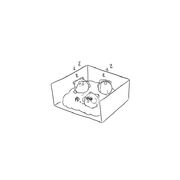
Koyukkuri in a box.
Even in nature, given the lackadaisical nature of yukkuri upbringing, the survival abilities of koyukkuris are truly dim, with the ability of yukkuri to breed in large number accounting for the survival of each entire species. However, a human caring for a koyukkuri from its infancy will help ensure their survival, and besides outright killing the ko, there is a very good chance the yukkuri will survive.
If a human happens to find a stalk, and if they want to raise yukkuri, the best course of action for avoiding premature births or ill-born koyukkuris is to place the stalk in a cup of sugary water. According to some stories, orange juice is fine too. For others, orange juice would hasten their growth too much, stunting the koyukkuri’s mental and physical growth. However, a premature ko can still be fed with sugar water through a pipette until its big enough to eat. Humans wanting koyukkuri can also purchase them at pet stores (this is the most recommended way).
While the first food of every koyukkuri should be its own stalk, a human may “cheat” by buying additional stalks from a pet shop, or steaming some broccoli. In nature, responsible parent yukkuris take great care in feeding their kos slightly bitter food to avoid spoiling their tastebuds and in turn making them picky. As such, a human caring for a koyukkuri should keep “shweet shweets” only for important occasions. Furthermore, a slightly bitter food such as a specific koyukkuri food, will stifle their natural instinct to gorge (As wild life forms, yukkuris are deathly afraid of starvation) and prevent obesity and constipation. That being said, food for the koyukkuri must be soft or else the ko will break its soft teeth. So, food for koyukkuri or soft foods like steamed vegetables work best in their starting months.
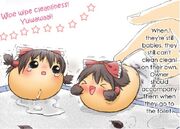
A guide explaining to the owner on how to clean a koyukkuri.
If there aren't any adult yukkuris around, the owner is supposed to take the place of the parent. The owner will have to place especially young koyukkuri near food and water, encourage them to hop around when they’re big enough, rub their bellies with a damp cloth, simulating lick lick to allow them to poo poo, and devote as much time as they can to playing with them. Also, it's better to give them a proper yukkurarium, or at least a big cage, to shield them from the dangers of the average human room, such as high places and dangerous items. In nature, a parent yukkuri often does “clean clean,” licking its offspring clean to prevent mold, which is dangerous to a yukkuri. While a human can lick a koyukkuri clean, it's HIGHLY recommended they don't. Instead, to clean a koyukkuri, gently rub off any dirt or poo poo using a damp cloth. A owner should also give a koyukkuri a full body cleaning at least once a week by placing it in a small cup or egg rest and gently scrubbing it with a soft brush and special yukkuri detergents. To avoid mold from developing between baths, the owner is encouraged to keep a close eye on the koyukkuris, and rub gently their bottom with a damp cloth wherever (or in a reasonable time frame) sees them defecating or peeing. A heated cotton swab may be used for hardened poo.
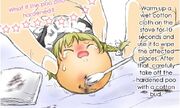
Removing harden poo poo on a koyukkuri.
As anticipated in the “behavior” section, koyukkuris are more moody than adults, and as such they may go from absolute happiness to broody sadness in no time, especially since they’re still too little to be carried without the risk of injury and almost no owner is able to stay home all the time to pamper and spoil them with the attention they crave. For that reason, an owner should try to raise at least two koyukkuri at a time, or, if a second koyukkuri would be cost-prohibitive or could potential ruin the first koyukkuri, provide it with lots of distractions such as a well furnished yukkurarium or small toys(ranging from playing furniture for the yukkurarium to “Mister Treasures”). The koyukkuri will then spend its spare time playing with the provided toys, getting enough distraction to avoid fixating on its owner’s absence and, as a benefit, keeping itself healthy and full of strength by exercising its small body, gaining a more stretchy and sturdy skin and the ability to move more easily and with more stamina. Koyukkuris can’t tell real yukkuris and crafted yukkuri dolls apart, thus presenting the yukkuri with an adequate doll will prevent them from feeling loneliness and prepare it for nurturing and caring for a real baby yukkuri when it reaches adulthood (assuming the owner wishes to allow their yukkuri to breed).
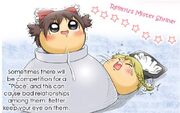
Koyukkuri and easy places. Careful, more then one koyukkuri could desire such place.
Giving koyukkuris a “Easy Place” all for themselves is a great way to boost their “easiness”, as this allows a koyukkuri to have a private place to associate with rest, play, and safety. While Factory-bred and pet shop bred kos aren't accustomed to the wild, they retain a marked preference for small, secluded places with dark and narrow areas. Nonsensical as it may be (as koyukkuri can at times be scared of the dark and the unknown and hate loneliness), that stems from their genetic memory and instinct, because koyukkuris in nature are kept safe by their parents in small, dark nests or hide in their parents accessories and hair for added safety. As such, a good owner should at least leave the koyukkuri a self-contained easy place (very important in the case of owning more then one koyukkuri). Such easy places can be small paper cups, empty toilet paper rolls or a little pet home, allowing the koyukkuri to hide and feel safe. Some owners have experimented with aluminium cans cut in half, but the uneven, sharp edges of the can may badly cut the ko, scarring and hurting it. As mentioned, if a owner has more then one koyukkuri it is highly advised to place at least two such items per koyukkuri. Koyukkuri can easily forget which little home is their own, so having multiple hideaways will help them feel safe.
Koyukkuri, much like adults, have a tendency to declare their easy places in areas already occupied by another yukkuri. This has resulted in fights between koyukkuri and hurt feelings. As a rule of thumb (and mentioned above) each koyukkuri should be provided with two or three "easy places".
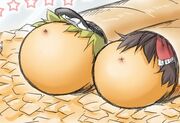
Koyukkuri hiding in "easy places".
The easy place can also be used as a formative experience for the koyukkuri. An owner willing to teach their new pet the value of some early responsibility may wait for the ko to give its “Home Declaration,” then playfully give it some simple materials useful for nesting, such as discarded pillow stuffing (“Mister Fluffy Fluffy”), a wide and small flat rock (“Mister Table”) and a small box for its toys, giving the koyukkuri explicit permission to arrange its living space as it sees fit, gently praising it for its neatness and calmly scolding it if it acts unruly. While the koyukkuri will be overjoyed at having an easy place and will feel happiness for being able to arrange it as it sees fit and being praised by its owner (a parental figure for every pet koyukkuri), it will also learn to lessen its absolute dependence on the owner, cooperating in keeping its nesting place nice and clean.
Also, while the owner should give as much care to its koyukkuri as they can, it's important to set some rules; To teach a koyukkuri to use its pet toilet, the owner might refuse to clean up poo poo unless the excrement is in the toilet. The extreme reluctance of a koyukkuri to live in a dirty nest and touch its own excrement will soon force the baby yukkuri to use its toilet, quietly waiting for the owner to bring the poo poo away. To avoid the koyukkuri from growing up spoiled, sweets or tasty food may be given only as a reward for completing simple tasks, such as the exercises needed for its badge examination. While positive reinforcement is the best way to educate a koyukkuri, it may be insufficient, and the owner may need to punish an unruly koyukkuri. The second best way to correct a ko, save from outright abuse which doesn't work for training, is playing on its instinctive guilt. By loudly claiming to a nicehead baby yukkuri that its behavior had truly saddened you, making you feel “uneasy,” the koyukkuri will feel instantly guilty of having stolen your easiness, trying hard to restore it. Failing that too, a gentle flick on its forehead will feel for a small koyukkuri as a loud slap. While some owners may feel reluctant to harm their beloved ko, the harm will not last and the koyukkuri will forget about the incident, though having a knowledge of that doing something bad will result in pain. To much harm, beyond the obvious result of dealing serious or fatal damage, will stunt the mental growth of the ko and cause them to become depressed.
The utter lack of common sense of a koyukkuri, coupled with the simplistic mindset of their brethren, may allow for some clever variations of the positive/negative reinforcement way to educate a juvenile individual. A koyukkuri may, for example, be punished by being slapped with a ruler, or another item large and soft enough to avoid permanent damage to its weak, little body but provoking a painful reaction in it, with the owner then pretending to "Take Mister Hurt Hurt away". The koyukkuri, believing that everything is somewhat "alive", or has a meaning for "its action", will believe that the owner just saved it from "Mister Hurt Hurt", and then the owner could explain the ko how "Mister Hurt Hurt comes only for bad children", leading the koyukkuri to learn good from bad by associating bad with "Mister Hurt Hurt" and good with "Mister Owner".
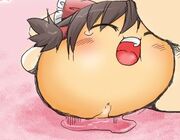
A koyukkuri being petted by its owner.
Since koyukkuris lack stamina and resilience, almost every single ailment affecting adult yukkuris may have deathly effects in no time, with diarrhea, constipation and molds as the most common causes of an early demise of koyukkuris, save for physical accidents. Anti-yukkuritis is also a common occurrence, due to the feelings of abandonment a koyukkuri taken away from its early "easy place" (the pet shop) or its family may feel in the very first day of its new life as a pet yukkuri, the stress of being given a pet grade education (often a long process of flicks on the forehead and gentle reprimands due to their simple and childlike mindset) and the inability to deal with even mild stressful situation without the constant tutelage of a "parent figure". So, when the owner finds the Koyukkuri in the throes of Anti-Yukkuritis (trembling, faintly bemoaning its suffering without any physical ailment, calling upon its mommy, throwing up its filling, crying and refusing to move from its fluffy bed), the best course of action is keeping it from throwing up by pushing very gently the filling back in, petting the ko and lovingly praise it for its easiness, giving it orange juice to restore its strength and sweets to make it happy again.
The koyukkuri should now recover in no time and, if already able to speak, be able to explain its owner the causes of its depression. However, as a rule of thumb the most common causes are loneliness, being given a food overtly bitter, being left in an unclean place for too much time, being hurt with no one able to give it immediate care and comfort and damaging its accessory. As for the latter, it should be noted that pet koyukkuris need their accessories to reach "Easiness" as much as every other yukkuri does, and pet shops have a vast selection of replacement accessories for every size, age and type of yukkuri. Some Anons have experimented with the Yukkuri Belief Power, somewhat stronger in koyukkuris, by gently praising them and telling that their usual pitiful attempts to lick lick and "comfort" a broken accessory by begging it to heal are effective and useful. This lie has proven effective in a small number, allowing the koyukkuri to "magically" restore its accessory, the safest route is still replacing a torn of broken accessory when the koyukkuri is asleep, or by reassuring the koyukkuri that the owner was able to magically repair its original accessory, thus making it proud and certain about its inherent easiness.
Naming conventions[]
Usually, a koyukkuri gets its name from its main species, with the ko- (japanese for "little") prefix affixed. For example, Koyukkuri Alice, Koyukkuri Marisa, Koyukkuri Reimu and so on.It's also possible using the ko- prefix with the japanese abbreviated version of the original Yukkuri name, thus having koarisukkuri, komarisa and koreimu.
However, some recent stories started to denote the koyukkuri with the slurred version of their names, since in nature a Yukkuri will never use the koyukkuri word to denote itself or its little one. As such, a komarisa would sometimes be called a "Maricha", a koreimu a "Reimyu", a koalice an "Awish", a kopatche a "Patchuwi" and so on.
